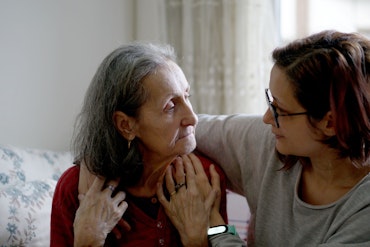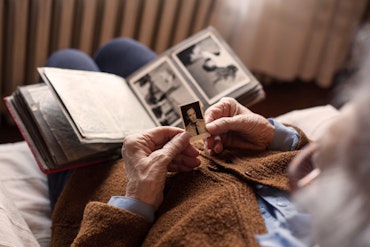Dementia Australia has called on Members of Parliament to deliver psychosocial support
Dementia Australia has called on Members of Parliament to deliver widespread access to psychosocial services due to the limited efficacy of other forms of treatment.
![<p>Dementia Australia released the creative arts engagement, well-being and dementia report to highlight the need for widespread access to psychosocial support. [Source: Shutterstock]</p>](https://agedcareguide-assets.imgix.net/news/articles/wp/Dementiadance.jpg?fm=pjpg&format=auto&w=550&q=65)
Dementia Australia released the creative arts engagement, well-being and dementia report to highlight the need for widespread access to psychosocial support. [Source: Shutterstock]
Key points:
- Over 400,000 Australians live with dementia and more than 1.5 million people are involved in their care
- The I believe in the magic of it discussion paper was shared at a Federal Parliamentary Friends of Dementia event in Canberra
- The paper highlighted the need for widespread access to psychosocial support for people with dementia in the absence of a definitive treatment method
A new discussion paper from Dementia Australia has revealed the need for widespread access to psychosocial support for people with dementia, in the absence of any definitive treatment method and the limited efficacy of pharmacological approaches.
The paper, I believe in the magic of it, highlights that engaging in creative arts activities can lead to cognitive, physical and social stimulation, which can have significant benefits in dementia risk reduction and managing the disease.
Dementia Australia Chief Executive Officer Maree McCabe AM said the range of benefits creative arts provide includes social engagement, creative expression, a sense of identity and purpose.
“Dementia is one of the most significant health and social challenges facing Australia and the world, with more than 400,000 Australians currently living with dementia,“ Ms McCabe said.
“Engagement in creative arts can offer significant benefits in dementia risk reduction and disease management.
“Carers and family members also benefit through their own involvement in arts-based activities and improved well-being and quality of life of the person they are supporting.”
Studies on the benefits of creative arts for people with dementia have mainly focused on activities such as painting, music listening and creation, dance, singing, reminiscing, storytelling and life review.
Col and Shirley Blake have been married for 50 years and for the past seven years Shirley has lived with dementia and Col has been her carer. They have always taken part in creative activities, including working as extras in film and television productions and jive dancing, which became even more important since Shirley’s dementia diagnosis.
Mr Blake believes that social engagement, as much as the creative activity itself, benefits them.
“When we jive, Shirley hasn’t got dementia […] it is something she can do without thinking about it […] she gets so much enjoyment out of it. She’s more relaxed and more of her old self,” Mr Blake said.
The ‘Artful: Art and Dementia’ program at the Museum of Contemporary Art Australia has provided a similarly stimulating experience for the couple, who are among the 92 percent of respondents who said their participation had improved their mood.
Dr Janet Thomas was diagnosed with dementia shortly before turning 70 and has had a life-long fascination with reading, writing, studying and teaching literature.
Dr Thomas has always believed in the benefits of writing and found that her diagnosis of dementia has made her reflect on her creative practice.
“The bottom line for me since I got my diagnosis is how do I go out into the world and show that I’m still functioning […] that we still have something to contribute, we can still be creative, we can continue to be engaged,” Dr Thomas said.
Janet’s mother lived with dementia, so she has a clear-eyed understanding of the potential consequences of her diagnosis. She has an equally determined commitment to not only maintain her creative practice but also to advocate for the benefits of the creative arts for people living with dementia.
Ms McCabe said the evidence in the discussion paper should be used as a guide to ensure people living with dementia, their families and carers have access to creative art programs in their communities.
“During the event today, Dementia Australia called on Members of Parliament to use this evidence and advocate to their electorates including multicultural and business leaders to ensure people living with dementia, their families and carers have access to and are included in the development and content of arts programs,” Ms McCabe said.
“It is clear that engaging in the creative arts can and does make a critical contribution to supporting the well-being of people living with dementia, their families and carers.”
What do you hope to see in the 10-year National Dementia Action Plan? Let the team at Talking Aged Care know and subscribe to the newsletter for more news and information.
For support, please contact the National Dementia Helpline on 1800 100 500.
Related information:























